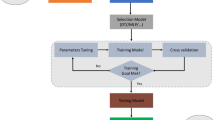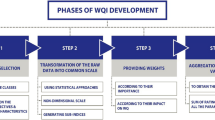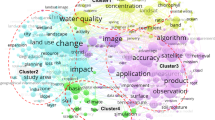Abstract
In the field of water management, the evaluation of sustainability has no universal methodological approach nor any consensus regarding the definitions of sustainability or sustainable development. There is an essential need therefore for a precise definition of sustainability in different water management fields. This paper deals with the sustainability of one part of urban water management, namely a water supply. A precise definition of a sustainable water supply system is given, together with a methodological framework that quantifies the degree of water supply sustainability. The proposed framework relies on the proposed quasi-strong sustainability concept, its components (dimensions), their particular relationships and corresponding indicators representing individual processes in the water supply system and utility. The processing of indicators is performed through a joint fuzzy logic/neural network (ANFIS) model. In order to evaluate each sustainability component, separate ANFIS models were created whose results were aggregated into a single result (sustainability index). According to the presented framework, sustainability is evaluated for 17 public water supply systems/utilities in Croatia.



Similar content being viewed by others
References
Adinyira E, Oteng-Seifah S, Adjei-Kumi T (2007) A review of urban sustainability assessment methodologies. In Web Proceedings of International Conference on Whole Life Urban Sustainability and its Assessment, Glasgow, pp 1–10
Alegre H, Baptista JM, Cabrera E Jr, Cubillo F, Duarte P, Hirner W, Merkel W, Parena R (2006) Performance indicators for water supply services - 2nd Edition. IWA Publishing, London
American Society of Civil Engineers (ASCE) (1998) Sustainability criteria for water resource systems. American Society of Civil Engineers publications. Reston, USA
Angelov P, Xydeas C (2005) Fuzzy systems design: direct and indirect approaches. Soft Comput 10:836–849. doi:10.1007/s00500-005-0006-x
Bell S, Morse S (2008) Sustainability indicators: measuring the immeasurable? - 2nd edition. Earthscan, London
Carden K, Armitage N P (2013) Assessing urban water sustainability in South Africa - not just performance measurement. WaterSA 39(3). WISA 2012 special edition: 345-350. doi:10.4314/wsa.v39i3.1
Chen Z, Ngo HH, Gou W (2012) A critical review on sustainability assessment of recycled water schemes. Sci Total Environ 426:13–31. doi:10.1016/j.scitotenv.2012.03.055
Cordón O (2011) A historical review of evolutionary learning methods for Mamdani-type fuzzy rule-based systems: designing interpretable genetic fuzzy systems. Int J Approx Reason 52:894–913. doi:10.1016/j.ijar.2011.03.004
Gui-Torres D (2007) Sustainability indicators and the assessment of urban water systems: Seeking for a robust way forward. Young Scientific Workshop: Urban Water Innovation. Delft University of Technology, Delft, The Netherlands
Juwana I, Muttil N, Perera BJC (2012) Indicator-based water sustainability assessment - a review. Sci Total Environ 438:357–371. doi:10.1016/j.scitotenv.2012.08.093
Karleusa B, Berakovic B, Rajcic V (2010) Expert system for checking efficiency of water management planning activities. GRADEVINAR 62(1):1–11
Kaur A, Kaur A (2012) Comparison of Mamdani-type and Sugeno-type fuzzy inference Systems for air Conditioning System. International Journal of Soft Computing and Engineering (IJSCE) 2:323–325
Kjeldsen TR, Rosbjerg D (2004) Choice of reliability, resilience and vulnerability estimators for risk assessments of water resources systems. Hydrological Sciences–Journal–des Sciences Hydrologiques 49(5):755–767. doi:10.1623/hysj.49.5.755.55136
Leeuwen van CJ, Frijns J, Wezel van A, de Ven van FHM (2012) City blueprints: 24 indicators to assess the sustainability of the urban water cycle. Water Resour Management 26:2177–2197. doi:10.1007/s11269-012-0009-1
Leeuwen van K, Marques R C (2012) Current state of sustainability of urban water cycle services. Trust project publication D11.1, IWW water Centre, Germany. http://www.trust-i.net/downloads/index.php?iddesc=68. Accessed 10 June 2014
Loucks D (1997) Quantifying trends in system sustainability. Hydrological Sciences-Journal-des Sciences Hydrologiques 42(4):513–530. doi:10.1080/02626669709492051
Palme U, Tillman AM (2009) Sustainable urban water systems in indicators: researchers recommendations versus practice in Swedish utilities. Water Policy 11:250–268. doi:10.2166/wp.2009.013
Popawala R, Shah N C (2011) Evaluation of sustainability index for urban water management system. In proceedings of the 2nd International Conference on environmental science and development - IPCBEE Singapore, vol.4: 267-270
Ross TJ (2004) Fuzzy logic with Engineering applications, 2nd edn. John Wiley and Sons Ltd, Chichester, England
Sarang A, Vahedi A, Shamsai A (2007) How to quantify sustainable development: a risk-based approach to water quality management. Environ Manag 41:200–220. doi:10.1007/s00267-007-9047-5
Simonovic S (2001) Measures of sustainability and their utilization in practical water management planning. In: Jun X (ed) Schumann a H, Acreman M C, Davis R, Marino M a, Rosbjerg D. Regional Management of Water Resources the Sixth IAHS Scientific Assembly. Maastricht, Netherlands, pp 3–16
Singh RK, Murty HR, Gupta SK, Dikshit AK (2008) An overview of sustainability assessment methodologies. Ecol Indic 9:189–212. doi:10.1016/j.ecolind.2011.01.007
Soroczynski T (2002) Integrated systems analysis and sustainable development. Rizzoli a E, Jakeman a J (Eds) in proceedings of the iEMSs 2002 Conference. Integrated Assessment and Decision Support. Lugano, Switzerland, pp 133–138
Van Leekwijck W, Kerre EE (1999) Defuzzication: criteria and classication. Fuzzy Sets Syst 108(2):159–178. doi:10.1016/S0165-0114(97)00337-0
Yannis AP, Vassilis SK (2009) Fuzzy measurement of sustainability. Nova Science Publishers, New York
Author information
Authors and Affiliations
Corresponding author
Rights and permissions
About this article
Cite this article
Halkijevic, I., Vukovic, Z. & Vouk, D. Indicators and a Neuro-Fuzzy Based Model for the Evaluation of Water Supply Sustainability. Water Resour Manage 31, 3683–3698 (2017). https://doi.org/10.1007/s11269-017-1695-5
Received:
Accepted:
Published:
Issue Date:
DOI: https://doi.org/10.1007/s11269-017-1695-5




